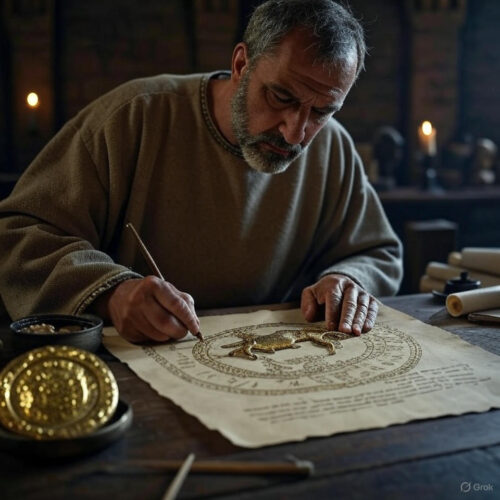#### Introduction: A Day That Changed History
On September 26, 1212, a pivotal moment unfolded in the heart of medieval Europe that would ripple through centuries, shaping nations and individual destinies. The issuance of the *Golden Bull of Sicily* by Emperor Frederick II certified the hereditary royal title of the Přemyslid dynasty in Bohemia, marking a transformative event in European politics. This decree wasn’t just a piece of parchment sealed with gold; it was a catalyst for stability, power, and identity in a region that would influence the cultural and political landscape of Europe for generations. Today, this historical milestone offers profound lessons for anyone seeking to carve out their own legacy, define their purpose, and navigate the complexities of modern life with intention.
This blog dives deep into the historical significance of the *Golden Bull of Sicily*, exploring its context, impact, and enduring relevance. More than just a dusty relic of the past, this event provides a blueprint for personal empowerment, offering actionable insights to help you build a life of meaning and influence. With a blend of rich historical detail and motivational strategies, we’ll uncover how a 13th-century decree can inspire you to take charge of your future. Let’s embark on this journey through time and see how the echoes of 1212 can resonate in your life today.
#### The Historical Context: Europe in 1212
To understand the *Golden Bull of Sicily*, we must first step into the vibrant, turbulent world of early 13th-century Europe. The Holy Roman Empire, a sprawling patchwork of kingdoms, duchies, and city-states, was a political mosaic held together by the charisma and cunning of its emperors. In 1212, Frederick II, a young and ambitious ruler, sat at the helm of this empire. Known as *Stupor Mundi* (the Wonder of the World), Frederick was a polymath who spoke multiple languages, patronized the arts, and navigated the treacherous waters of medieval politics with unparalleled skill.
Bohemia, a region in what is now the Czech Republic, was a rising power within the empire. Ruled by the Přemyslid dynasty, Bohemia was a cultural and economic hub, but its status as a kingdom was not yet secure. The Přemyslids, led by Ottokar I, had been maneuvering for greater autonomy and recognition. Ottokar, a shrewd and determined leader, sought to elevate Bohemia from a duchy to a hereditary kingdom, ensuring that his successors would rule without needing imperial approval for each new king. This was no small feat in an era where power was often fleeting, and loyalty was a currency traded with caution.
The early 13th century was a time of upheaval. The Fourth Crusade had recently ended in 1204 with the shocking sack of Constantinople, shaking the Christian world. The Albigensian Crusade was raging in southern France, targeting heretics, while the Reconquista in Spain pitted Christian kingdoms against Muslim rulers. In this chaotic landscape, securing a hereditary title was a bold move that required diplomatic finesse, strategic alliances, and a touch of audacity.
Frederick II, crowned King of Sicily as a child and now Holy Roman Emperor, was embroiled in his own struggles. He faced challenges from rival claimants to the imperial throne, notably Otto IV, and needed to consolidate his authority. Granting Bohemia’s request for a hereditary kingship was a calculated move. By issuing the *Golden Bull of Sicily* on September 26, 1212, Frederick not only rewarded Ottokar’s loyalty but also strengthened his own position by securing a powerful ally in Central Europe.
#### The Golden Bull: A Document of Destiny
The *Golden Bull of Sicily* was a formal decree, named for the golden seal (*bulla*) affixed to it, a mark of imperial authority. Issued in Basel, Switzerland, during a diet (a formal assembly of princes), the document confirmed Ottokar I as King of Bohemia and established that the crown would pass hereditarily within the Přemyslid family. This was a game-changer. Unlike duchies, where rulers were often appointed or approved by the emperor, a hereditary kingdom meant stability and independence. Bohemia’s kings could now govern with greater confidence, knowing their lineage was secure.
The decree also outlined several privileges for Bohemia. It granted the right to invest bishops, a significant power in an era when the Church wielded immense influence. It exempted Bohemian nobles from certain imperial taxes and obligations, boosting the region’s autonomy. Additionally, the *Golden Bull* recognized Bohemia’s distinct identity within the Holy Roman Empire, setting the stage for its cultural and political flourishing in the centuries to come.
The impact was immediate and profound. Ottokar I, now officially King of Bohemia, solidified his dynasty’s legacy. His successors, including the famed Charles IV, would transform Bohemia into a center of learning, architecture, and trade. The *Golden Bull* also set a precedent for other regions seeking similar autonomy, influencing the political structure of the Holy Roman Empire. It was a masterstroke of diplomacy that balanced imperial authority with regional ambition, ensuring stability in a volatile era.
#### The Broader Impact: Bohemia’s Rise and Europe’s Transformation
The *Golden Bull of Sicily* did more than elevate Bohemia’s status; it reshaped the political dynamics of Central Europe. By granting hereditary kingship, Frederick II created a stable ally that could counterbalance other powerful regions, such as Bavaria and Saxony. This move strengthened the Holy Roman Empire’s cohesion at a time when internal divisions threatened to tear it apart.
Bohemia’s new status also had cultural ramifications. The Přemyslid dynasty invested heavily in monasteries, churches, and early universities, fostering a vibrant intellectual tradition. Prague, the Bohemian capital, would later become a cultural jewel under Charles IV, who founded Charles University in 1348, one of the oldest universities in Europe. The stability provided by the *Golden Bull* laid the groundwork for these achievements, as a secure monarchy could focus on long-term development rather than constant power struggles.
The decree also had ripple effects across Europe. By recognizing Bohemia’s autonomy, Frederick II set a precedent for decentralizing power within the empire. This model influenced later documents, such as the *Golden Bull of 1356*, which formalized the election of the Holy Roman Emperor by seven prince-electors, including the King of Bohemia. The 1212 decree was a stepping stone toward a more structured, albeit complex, imperial system.

#### Why It Matters: Lessons from 1212
The *Golden Bull of Sicily* is more than a historical footnote; it’s a testament to the power of vision, strategy, and legacy-building. Ottokar I’s pursuit of a hereditary kingship was a bold act of self-determination, while Frederick II’s decision to grant it was a masterclass in strategic compromise. Both leaders understood the value of creating stability and identity in uncertain times—a lesson that resonates deeply in today’s fast-paced, unpredictable world.
In 1212, the world was no less complex than it is now. Rulers navigated alliances, rivalries, and economic pressures, much like individuals today juggle careers, relationships, and personal goals. The *Golden Bull* teaches us that clarity of purpose, coupled with strategic action, can create lasting impact. Whether you’re leading a team, building a business, or pursuing a personal dream, the principles behind this historical event offer a roadmap for success.
#### Applying the Golden Bull to Your Life Today
The *Golden Bull of Sicily* offers timeless lessons for crafting a life of purpose and influence. Here’s how you can apply the principles of this 13th-century decree to your modern life, with a detailed plan to help you take action:
– **Define Your Legacy**: Ottokar I had a clear vision—to secure his dynasty’s future. Ask yourself: What legacy do you want to leave? It could be a thriving family, a successful career, or a positive impact on your community. Write down your long-term vision in a journal, specifying what success looks like in five, ten, or twenty years. Revisit this vision monthly to stay focused.
– **Seek Strategic Alliances**: Ottokar’s success relied on his alliance with Frederick II. Identify mentors, colleagues, or friends who share your values and can support your goals. For example, join a professional network or attend a workshop to connect with like-minded individuals. Schedule at least one coffee chat or virtual meeting per month to build these relationships.
– **Secure Your Foundation**: The *Golden Bull* provided Bohemia with stability. Build your own foundation by investing in your skills, health, and finances. Create a personal development plan: enroll in an online course to enhance your expertise, commit to a weekly exercise routine, and set up a savings plan with automatic contributions of at least 10% of your income.
– **Advocate for Your Worth**: Ottokar boldly petitioned for Bohemia’s kingship. Don’t shy away from advocating for yourself, whether it’s negotiating a raise, pitching a project, or sharing your ideas. Practice your pitch in front of a mirror or with a trusted friend, aiming to communicate your value confidently in under two minutes.
– **Embrace Long-Term Thinking**: The *Golden Bull* was about securing the future, not just the present. Make decisions with your long-term goals in mind. For instance, if you’re considering a career change, evaluate how it aligns with your vision rather than focusing solely on immediate benefits. Create a pros-and-cons list for major decisions, weighting long-term impact heavily.
– **Celebrate Milestones**: The Přemyslids celebrated their new status as a kingdom. Acknowledge your progress, no matter how small. Set monthly milestones—completing a project, reaching a fitness goal, or saving a specific amount—and reward yourself with something meaningful, like a favorite meal or a day trip.

#### A 30-Day Action Plan to Live the Legacy of the Golden Bull
To make these lessons actionable, here’s a 30-day plan to help you channel the spirit of the *Golden Bull of Sicily* into your life:
– **Days 1–5: Clarify Your Vision**
– Write a one-page statement describing your personal or professional legacy. Be specific: What impact do you want to have? Who will benefit?
– Share your vision with a trusted friend or mentor for feedback.
– Create a vision board (digital or physical) with images and words that represent your goals.
– **Days 6–10: Build Your Network**
– Identify three people who can support your goals (e.g., a mentor, a colleague, a community leader).
– Reach out to one person via email or social media, proposing a meeting to discuss shared interests.
– Attend a local or virtual networking event related to your field or passion.
– **Days 11–15: Strengthen Your Foundation**
– Sign up for a course or workshop to develop a key skill (e.g., public speaking, coding, financial planning).
– Establish a daily health habit, like a 20-minute walk or meditation session.
– Review your budget and set up an automatic transfer to a savings or investment account.

– **Days 16–20: Advocate for Yourself**
– Identify one opportunity to showcase your value (e.g., a work presentation, a community project).
– Prepare a concise pitch highlighting your skills and vision. Practice it three times.
– Schedule a meeting with a decision-maker (e.g., a boss, a client) to share your idea or request.
– **Days 21–25: Think Long-Term**
– Review a major decision you’re facing (e.g., a job change, a move). List its long-term benefits and risks.
– Consult with someone who has made a similar decision to gain perspective.
– Adjust your plans to prioritize outcomes that align with your legacy vision.
– **Days 26–30: Celebrate and Reflect**
– Set a small milestone to achieve by day 30 (e.g., completing a project, hitting a fitness goal).
– Plan a reward for reaching this milestone, like a special outing or treat.
– Reflect on your progress in a journal, noting how your actions align with your vision. Adjust your plan for the next 30 days.

#### The Ripple Effect: From 1212 to Your Future
The *Golden Bull of Sicily* wasn’t just a moment in time; it was a catalyst for transformation. It empowered a dynasty, stabilized a region, and set the stage for centuries of progress. Similarly, your actions today can create a ripple effect, shaping your future and influencing those around you. By defining your purpose, building alliances, and acting with intention, you can emulate the strategic brilliance of Ottokar I and Frederick II.
Consider the story of a modern entrepreneur who, inspired by historical lessons, launched a sustainable business. She defined her legacy as creating eco-friendly products, built a network of like-minded innovators, and advocated for her vision at industry conferences. Over time, her small startup grew into a movement, impacting communities and inspiring others. This is the power of applying historical wisdom to modern challenges.
#### Conclusion: Seize Your Golden Moment
The *Golden Bull of Sicily*, issued on September 26, 1212, was a triumph of vision, strategy, and legacy. It transformed Bohemia, strengthened the Holy Roman Empire, and left an indelible mark on European history. Today, its lessons are a call to action for you to define your purpose, build your foundation, and create a legacy that endures.
As you move forward, let the *Golden Bull* inspire you to act boldly. Whether you’re pursuing a career goal, strengthening relationships, or making a difference in your community, you have the power to shape your future. Start today—write your vision, take one step, and watch how your actions echo through time, just as the *Golden Bull* did over 800 years ago. Your golden moment is now.


